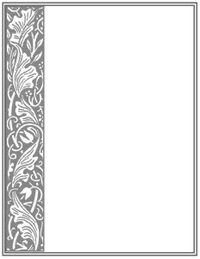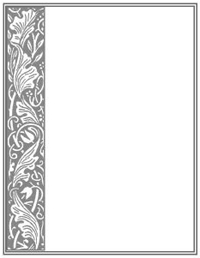Tulip Fever (15 page)

Sophia
Good pictures are very common here, there being scarce an ordinary tradesman whose house is not adorned with them.
—WILLIAM AGLIONBY, The Present State of the Low Countries, 1669
Gerrit, Jan’s servant, opens the door and lets us in. My husband and I step into the studio. Jan stands beside the finished painting.
I am sweating—my palms, my armpits. I didn’t want to come here but Cornelis insisted, and my refusal might have struck him as curious.
“Would you care for a glass of wine?” asks Jan, addressing my husband.
Cornelis is an intruder into my secret life. Surely he can sense that I have been here? The bed looms up; it seems abnormally large, standing in the corner of the room, its curtains closed. It draws the eye with a magnetic force.
Cornelis looks around. What if I have left something here, something that he will recognize? Even with no evidence the room is filled with my presence. He must surely feel it, that this is my true home now, that my heart is here.
Gerrit brings us
roemers
of wine on a tray—the best glasses. I sip, looking at Jan over the rim. He has greeted me politely; our eyes have barely met. If he is as nervous as I am he is keeping it well hidden.
“Does the painting meet with your approval, sir?” he asks.
Cornelis steps close to the canvas—he is shortsighted. He nods and murmurs to himself.
The pupil, Jacob, points. “It is finely rendered, is it not? Your legs in particular, don’t you think? Regard the brushwork.”
Cornelis nods. “Very fine. My dear, do you like it?”
My hand trembles as I hold the glass. They are all watching me. Jacob has a pale, intelligent face; he misses nothing. Gerrit’s lumpy peasant’s face is like a potato. In their different ways they are both dangerous. Will they betray me? Yet I am also filled with tenderness for them; they belong to this place, they are included in my love.
I start to speak, but Cornelis interrupts me. “Oh, but I look old!” he says. “I am but sixty-one yet I look an old man—is this how the world sees me?” He turns to me with a thin smile. “We should call this painting
Winter and
Spring
.”
“I paint what I see,” says Jan shortly. “Nothing more and nothing less.”
“You have certainly caught
her
beauty.” Cornelis turns to me. “The bloom on her cheeks, her freshness and youth like the dew on a peach. Who was it—Karel van Mander? Who, on seeing a still life, tried to reach into the canvas and pluck the fruit?” He clears his throat. “Not realizing that this particular peach was not to be eaten.”
There is a silence. Outside, a bell chimes the hour. Does Cornelis suspect something?
“I will have the painting delivered to your house tomorrow,” says Jan, taking our empty
roemers
. He looks uncomfortable; he is longing for us to leave.
But I must speak to him. I must tell him about Maria’s pregnancy and the idea that has been brewing in my mind—an idea so bold, so breathtaking that I hardly dare put it into words. Now is not the time, for Jan is ushering us to the door. It pains me that I cannot kiss him good-bye.
As I pass him I whisper: “I have a plan.”

“WHAT DID YOU SAY?”
Maria stares at me, her eyes as round as platters. All day she has been dozy but now she is wide awake. We are in the parlor. Above her hangs a canvas of a slaughtered hare; it is my least favorite painting in the house. Hooked up by its bleeding hind leg, the hare hangs upside down. Its eye, glazed by death, rests on us with indifference as I tell her my plan.
Maria claps her hand to her mouth. “But, madam—but you can’t!”
“
I
can, but what about you?”
“But . . . but . . .” Her voice trails away. My robust, chatty maid—for once she is silent.
Then her face breaks into a grin. She sits there under the sacrificial hare—a pitiful, furry
Descent from the Cross
—and shakes with appalled laughter.

27

Cornelis
You must cultivate the infertile land so that it can bear fruit,
Dig, uproot, make trenches,
Pull out the weeds, from the very first day,
So that your esteemed husband can sow there afterwards.
—JACOB CATS, Moral Emblems, 1625
“And the flood was forty days upon the earth; and the waters increased, and bare up the ark, and it was lift up above the earth . . . and all flesh died that moved upon the earth, both
of fowl, and of cattle, and of beast and of every creeping thing that
creepeth upon the earth, and every man . . . all in whose nostrils
was the breath of life, of all that was on the dry land, died . . .”
Cornelis is reading to his wife. This chapter in Genesis always stirs him. His country, too, was once drowned. Floods engulfed the land, but with God’s will the people of Holland reclaimed it from the sea; they redeemed it and created an earthly paradise—fertile soil, fair cities, a peaceful and tolerant country where faiths could mingle, Mennonite and Catholic, Protestant and Jew, the lion lying down beside the lamb. How fortunate they are, and how especially fortunate he is.
Sophia’s head is bent over her sewing; she is darning a bedsheet. The oil lamp shines on her soft brown hair, curly at the temples, coiled at the nape of her neck. Their portrait now hangs on the wall; it was delivered yesterday. The picture seals their union. And his business is flourishing. He has shares in several ships. This month a fleet of two hundred vessels is setting sail for the Baltic; from there they will carry grain to southern Europe. In August a fleet of twenty ships is due to return from the East Indies laden with spices, ivory and two hundred tons of gold apiece. If God grants them a safe passage Cornelis will make a substantial profit.
“And God remembered Noah, and every living thing, and all
the cattle that was with him in the ark; and God made a wind to
pass over the earth, and the waters assuaged . . . and Noah removedthe covering of the ark, and looked, and behold, the face of
the ground was dry.”
Cornelis closes the Bible. It is time for bed. Later, he remembers this evening as one of profound contentment. It is as if he already senses the joy to come.
For in bed, when he lays his hand on Sophia’s breast, she gently removes it.
“My dear,” she says. “I have some news that I know will please you as much as it delights me.” She strokes his fingers. “I visited the physician today and he confirmed what I have suspected. I am carrying your child.”

28

Sophia
Except the Lord built the house, their labour is but lost that built it. Except the Lord keep the city, the watchman waketh but in vain.
—PSALM 127
When I was little there was a picture that gave me nightmares. Back in Utrecht, where I grew up, my father owned a print shop. Our front room served as the shop; it opened onto the street where, under the canopy, more prints were displayed. Below street level, downstairs in the vault, that was where the printing press thrummed and clattered. My father printed pamphlets and leaflets—moral verses, sermons and edifying works recommended by the predicants:
The Threshold of Paradise, The Delight of Piety
. He also printed etchings and engravings of paintings.
The one that haunted me was pinned to the wall—perhaps it haunted him too, I never asked. It was a print of the great flood of 1421, the St. Elizabeth’s Day flood that drowned whole villages forever. The picture shows an expanse of water. Poking through the surface are tree tops and the spires of churches. The water has swallowed them up.
I gazed at it for hours—the stillness of the water, the tips of the spires, the horrors that lay beneath. God had saved Noah; why did these people deserve to be damned? I heard the bells tolling, calling drowned men to worship. Way below were bloated cattle with sightless eyes; they moved in the current, bumping against the roofs of barns. In one convulsion the world had been turned upside down. Deep in the water the dead moved helplessly. Their arms waved like weeds, but nobody came to their rescue.
